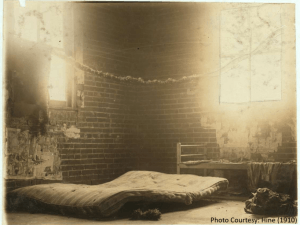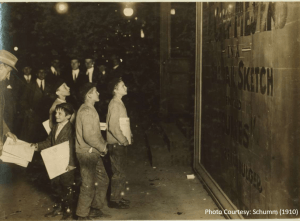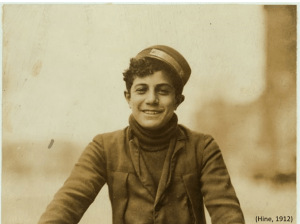“Phillip’s Permit” is a historical fiction based on the history of early twentieth century child labor in American cities. According to International Labor Organization (2017), globally there are 218 million children between five to seventeen years age who are currently employed, of which 152 million are victims of child labor, and 73 million work in hazardous child labor conditions. This narrative portrays the history of early twentieth century child labor in America. But, in the latter period of twentieth century the situation of child labor in America completely changed. Thus, the history gives a strong hope and proof that the global problem of child labor can be solved.
Phillip’s Permit
-Vijaya Tamla
The glaring street light, the cold rough floor, his father’s loud snores, and his step-brother’s occasional kicks and murmurings while in his dreams, were keeping Phillip awake. In the kitchen floor, except Phillip, his two step-brothers and his half-sister were in deep sleep. Had it been other nights, Phillip would have fallen asleep right after he laid on the floor. But the next day was an important day for Phillip. He was going to get his permit from Milwaukee county judge to work in Wisconsin Chair Company for 50 cents a day. Although, he had been laboring since six, his earning was officially going to support the family. Consequently, he had myriad thoughts intersecting his mind, with each changing thought, he tossed his sides.
Phillip was traveling back in time, from 1910 to 1903, from Milwaukee to a countryside in Russia. He had faint memories of his home, yet he felt that his family used to live happily with his grandparents until the war broke, which made them flee the country and become refugees. He missed his mother who got killed in the war. He shrunk his eyes to visualize her. Blur images appeared. Instead, he saw Pravda, his younger sister. The first time Phillip went to work was with her.
Pravda was three, and Phillip was six. Their father took them to North Market Street where some more kids were brought. The kids were picked by a sugar beet farmer in his farm-wagon pulled by a pair of horses. Phillip believed he had to protect his sister as her big brother. So, in the sugar beets he worked nearby his sister and made sure the farmer paid her share. Although she earned 5 cents a day while he earned 20, he had understood that their earnings were important to secure the two meals of the day, and floor as well as roof for the night. During dinner, their father always complained about not having enough money and hands for support. Eventually he remarried a Polish widow with two sons. Phillip sighed and refocused his flashback on Pravda.
Phillip and Pravda used to go to downtown streets afterschool. Like for other working-class children, the city streets were their playgrounds, freedom zones where no adults supervised, and places to pursue their little American dreams. Beer bottles dumped by the sidewalks were their treasure to scavenge. Once Phillip started boot-shining business with a black polish and a brush outside the City Hall. For one cent he would brush the shoes after slyly spitting on the boots to shine. For two cents, he used to give a quick polish touch. As his bootblacking did not go well, he joined the newsies.
Around 4 pm, with Pravda he stood outside the circulation office of Milwaukee Journal. With experience, Phillip had learned to purchase the right number of copies. One Friday, Phillip was tired of hustling the newspapers in the city streets. But he still had a whole stack of newspapers unsold. Despite using his best creativity in twisting the headlines, people barely showed any interest. The newspaper was dull, and the weather was cold. Phillip dragged Pravda and the stack of newspaper to Milwaukee Auditorium. He handed one newspaper to his sister, asked her to stand by the exit, and he hid behind a dark corner with the stack. As a couple exited the Auditorium, “Sir, the last paper, please!” Pravda approached exactly the way Phillip had taught her with an expression of poor hungry girl desperate to sell the last newspaper before returning home. By 11, the siblings sold all copies. They were enterprising. Phillip smiled remembering that incident. Unfortunately, five months back, Pravda suffered from an unknown infectious disease and untimely demised. Young Phillip regretted for failing to save her– though little could he do. A drop of tear creeped down Phillip’s right cheek. He turned and faced downwards.
Through his closed wet eyes, he saw a mid-aged man visiting his father, Joe one early morning. He pointed at Phillip and said, “He looks 14!” Joe knew Phillip aged 12 but, he replied, “He’d be 13 or 14, I’ve no certificate”. The man took $4, “I’ll getcha him da permit, take him to Wisconsin Chair Company.” The Company’s manager doubted Phillip’s age. Joe became angry.
Joe used to work in Milwaukee glasshouse as glassblower and Phillip’s step-brothers as apprentices. A month back, they lost their jobs after machines got introduced and the labor-union’s strikes failed. Phillip’s step-brothers had got into the Chair Company. But Joe was jobless. Phillip’s step-mother, a bottle washer, was able to retain her job with increased wage after the successful women bottle washers’ strike against the city breweries. Her earnings paid the house rent, and the boys’ bought some foods. Joe lamented on Pravda’s loss, “Had she been alive, she’d have earned some quarters like her little sister by accompanying mama.” Phillip tossed his side and gazed at his half-sister for a while. “I must sleep now,” he told himself. He had to leave early with his step-brothers. In the morning the man was going to handover Phillip’s permit; his license to work!
This work was a part of the remix submission to Professor Dr. Amanda Seligman’s Fall 2018 class on HIS USP 971 History of American Urban Problems.
A research paper based on an archival study of the child labor work permits issued by Ozaukee County Court, photographs depicting child labor from National Child Labor Committee Collection, and historiographic analysis of literature on child labor has also been published by the author in the UWM Digital Commons which can be accessed via;
Tamla Rai, Vijaya, “History of Early Twentieth Century Child Labor in America” (2018). History and Urban Studies 971: Seminar on the History of American Urban Problems. 4.
https://dc.uwm.edu/history_hist97/4





